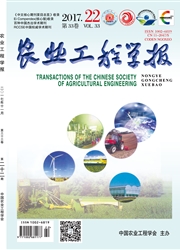

 中文摘要:
中文摘要:
小流域水土流失治理策略及其生态经济评价是水土保持学科的热点问题,以整个工程实施范围作为对象的研究成果鲜见报道。该文以四川省长江上游水土保持重点防治综合治理第五期工程整个治理区域为研究对象,以县级行政区内的小流域综合治理区域为评价单元,选取反映项目区社会经济和生态状况的46个指标,通过运用主成分分析法和多元线性回归分析,得出13种治理措施主成分,并对治理前后的生态经济状况进行综合评价和排序,建立了生态经济综合发展水平位次变化与治理措施主成分之间的多元线性回归模型。结果表明:不同的治理措施、治理措施实施的范围大小、实施的力度和强度是影响其对于生态经济发展水平贡献大小的主要原因。
 英文摘要:
英文摘要:
Soil erosion management strategy and its ecological economy evaluation in small watershed are hot issues of water and soil conservation disciplines.Researches taking the whole execution scope of the project as an object were few.Regarding comprehensive governance region of small watershed in county level administrative area as appraisal unit,this paper investigates the principal components of management approaches towards soil and water conservation in the fifth project in upper Yangtze River in Sichuan Province and relationship between the principal components and ranking of ecological economy development.In this paper,there are 46 socio-economical and ecological indices selected to represent the impacts of the project.By using principal component analysis and multiple regression analysis,there are 13 principal components found and there is a multiple linear regression model between ranking of ecological economy development and the principal components.The result shows that the different approaches,extension and intension of approaches are significant contributions to ecological economy development.
 同期刊论文项目
同期刊论文项目
 同项目期刊论文
同项目期刊论文
 期刊信息
期刊信息
